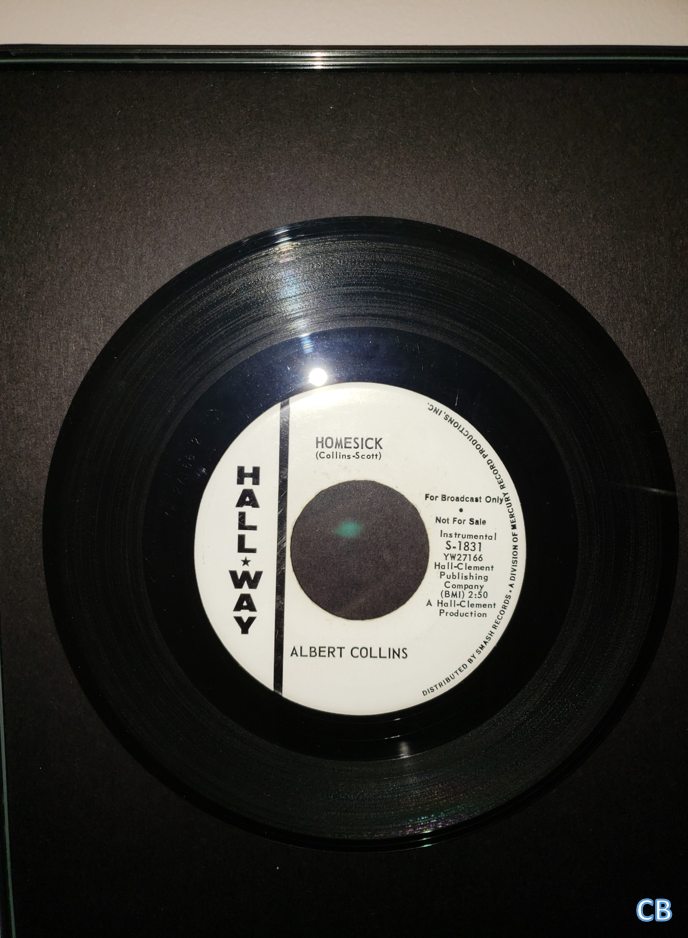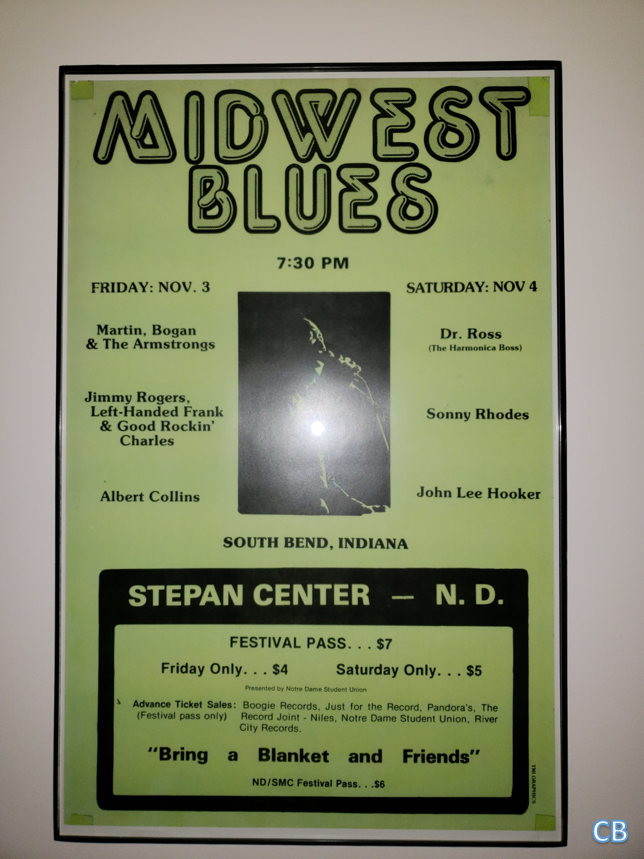Essential Blues Recording
Albert Collins – Collins’ Delivers On His First Alligator Records Label Release
Albert Collins – Ice Pickin’ – Alligator ALCD 4713
In what was his first full-length album in six years going back to 1972 (a Tumbleweed label collection), Albert Collins’ 1978 freshman release on the Alligator Records label began a recording relationship that saw him create six albums under his name, appear with Johnny Copeland and Robert Cray on a triple threat outing, appear on four of the label’s “Crucial” compilations, and also enjoy a best of release, as well. With a recording history that extended back to the 1960s on small Houston labels such as Hall-Way and Kangaroo, through a period of great acceptance by the 1960s rock crowd in both L.A. and San Francisco, and providing some fine, but not defining work for the Imperial label, Albert Collins was poised for his long-deserved greater success, and it finally arrived via this initial Alligator Records set.
A cursory viewing of the band supporting Collins on this recording lends the knowledgeable blues fan to recognize from the outset that something special had to happen with this lineup in support. Larry Burton, a superb blues guitarist who played on five Grammy nominated albums, appears here, as does the great blues bassist Aron Burton, whose time included stints with not only Collins, but with Freddie King and Junior Wells, let alone his good solo blues recording work. A.C. Reed, the Chicago blues’ iron man saxophonist, a man who enjoyed sixty plus years on the scene, having toured and recorded with Collins, Buddy Guy, Son Seals, Long Man Binder, in addition to having been involved as a sideman for the Chief, Profile, and Age stable of labels back in the 1960s, is on-board. In fact, Reed recorded his own collection for Alligator entitled I’m In The Wrong Business, as well as appearing on the label’s Living Chicago Blues III compilation.
Casey Jones, the fine Chicago drummer who recorded with McKinley Mitchell, the aforementioned A.C. Reed, Earl Hooker, Lonnie Brooks (on Alligator Records) and Johnny Winter (again, on Alligator Records), as well as Collins, lends his broad skill set here. Alan Batts is in excellent form on keyboards, while Chuck Smith contributes stellar baritone saxophone accompaniment.
Listening to Albert Collins’ guitar style is a most unique experience. Long known for what has been called his “icy” approach, upon reflection, the metaphor seems entirely appropriate. Collins’ guitar legacy is one of crisp, biting, skating, stinging, intense, and reverberating assaults that, for whatever the desired emotional cause, leave the listener shivering due to their sheer power and mood enhancement. However, what one must understand, is that for all of Collins’ ability to sever deeply with his guitar style, he utilizes space to great effect. A close listen to his solo runs reveals that ideal capability to build tension and excitement using the briefest of empty pauses. I don’t think that Collins gets as much credit for that as he should.
Here, Collins’ flashes of power and intensity, whether via great runs of picked elaborations, or through long sustained notes that sear and tear, ultimately add-up to explosions of furious emotional exclamations.
And perhaps that is the over-arching mastery of this Collins release; his ability to play both sides of the emotional fence with such aplomb via his guitar methodology. On a blues cut such as “Cold, Cold Feeling”, Collins can idyllically create and present an astounding mood of melancholy, yet on an up-tempo romp such as “Too Tired”, he seems to effortlessly fashion a natural sense of euphoria.
While I am not one whose specialty is to explain musical technique, Collins derived, it appears, his very singular sound via two melded performing tactics, and one his instrument choice. First, watching Collins, it was obvious that he picked his guitar using his thumb and his pointer finger, hitting the strings against his guitar’s fretboard. Also, and again, this technical “speak” escapes only the most basic of my understanding, Collins primarily preferred playing his guitar tuned to an open D-minor chord, meaning that the resulting sound offered is one normally used when one is seeking a “…heavy, serious atmosphere — and sometimes even creates an almost otherworldly sense of drama” (thank you, fender.com). Finally, by playing Fender Telecaster guitars, Collins’ style was enriched by that model’s solid body and ability to produce vivid, tough sharp sounds; that seems to sum-up Collins guitar technique and overall sound. He wasn’t known as “The Master Of The Telecaster” for nothing.
Collins’ vocals are more-than-serviceable. Fluctuating on this release between an almost-spoken delivery and a true blues voice of profound proficiency, Collins affords persuasive storytelling. On “Master Charge”, the listener feels the frustration of the pile of credit bills coming-in that Collins’ tongue-in-cheek manner conveys. But don’t be fooled. On deep subjects such as that found on “When The Welfare Turns Its Back On You”, Collins’ voice perfectly represents the angst, pain, and frustration that comprise the song’s backdrop.
On each selection, Larry Burton’s guitar support never intrudes. Batts’ keyboards ride the required tenor of each song, offering the best framework necessitated. Aron Burton’s bass work reflect his storied capabilities, almost becoming a song-within-a-song, which is what any fine bass line should be.
The combined efforts of Reed and Smith offer those layers of saxophone inter-play that only heighten a song’s eminence, while never over-playing, either in volume or via ill-devised passages; their work is top-shelf professional horn work. Finally, Jones’ crisp drumming provides that underlying rhythmic assuredness that each song will move forward in the tempo seen as ideal by the bandleader; his is always one of appropriate cadence.
This 1978 collection was nominated for a Grammy Award, and was bestowed the esteemed Best Blues Album Of The Year honor from The Montreux Jazz Festival.
Collins left us way too early in 1993 at the age of 61. I remember the last time I saw Albert Collins perform. It was in Kalamazoo, MI at the State Theater, one of those beautiful, historic, highly-ornate venues dating to 1927. It had to be around 1990, though I can’t be sure. I can still see Collins pulling that long guitar cord from behind him and leaving the stage to bring the blues to the audience, as in true Texas showmanship style, he walked to first floor of the site while the band chugged, churned, and burned behind him during his long romp amongst his worshippers.
The University Of Notre Dame is only a few miles to the west of my home, and in the 1970s, The University presented blues via its Midwest Blues Festival format. Below is a poster from one of the events. Albert Collins was on the Friday night bill that included Jimmy Rogers, Left-Handed Frank, & Good Rockin’ Charles, along with Martin, Bogan & The Armstrongs. Can you imagine seeing all this tremendous blues talent for a mere $5 admission price? And, the Saturday evening show had John Lee Hooker, Sonny Rhodes, and Dr Ross on the bill. Somewhere I have a cassette copy Collins’ show culled from the sound board.
Collins’ influence remains far-reaching to this day. This initial chronicle of his abilities and vitality on the Alligator Records label is essential to any creditable blues collection. Collins’ sway is felt to this day, and thank goodness he recorded the extensive catalog of blues he did for Alligator Records; it remains the most realized of his career. Without question, essential!

